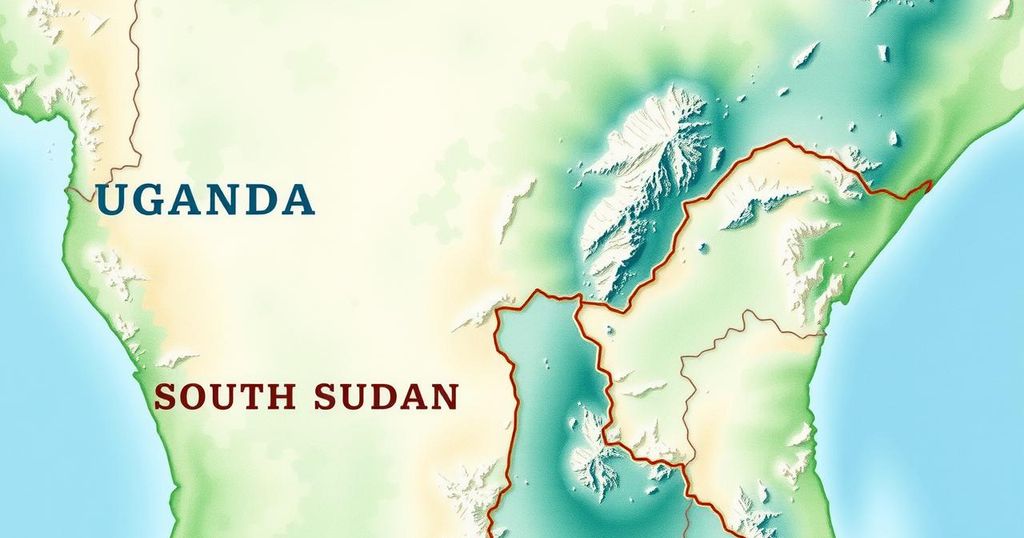Uganda’s Complex Role in South Sudan: Navigating Legacy and Stability
Uganda’s military involvement in South Sudan has raised concerns about governance, trust, and regional stability as President Museveni supports President Salva Kiir’s regime, which jeopardizes peace. The reliance on Ugandan troops undermines South Sudan’s sovereignty and military credibility. Historical ties are tested as Ugandan actions lead to perceptions of complicity in oppression. The international community should encourage withdrawal and focus on independent stability for South Sudan.
Uganda’s involvement in South Sudan has recently raised pressing concerns about governance and trust among neighboring nations. The controversy surrounding Ugandan troop deployments has revealed deeper issues, as President Yoweri Museveni appears to be significantly contributing to regional instability by supporting President Salva Kiir’s government at the expense of the peace and wellbeing of South Sudan. The implications of this relationship extend beyond mere military alliances, threatening to undermine both nations’ stability and security.
Relying on military assistance from a nation with unresolved border disputes poses risks for South Sudan, as it suggests an inability of the national army to address internal conflicts. Such reliance not only damages national integrity but also invites external interference, enabling other countries to exploit South Sudan’s vulnerabilities without fear of resistance. This dynamic erodes public trust in the South Sudanese government and signals weakness to external stakeholders.
The historical solidarity between Uganda and South Sudan during prior liberation struggles is undermined by Uganda’s recent military actions, which many view as support for an oppressive regime. Formerly regarded as allies, the perception has shifted since 2013, when Ugandan forces were deployed, allegedly committing serious human rights violations. The current view is that Uganda sides with the government rather than the citizens of South Sudan, leading to widespread discord.
The pattern of Ugandan military involvement seems directly correlated with the deteriorating relations between Salva Kiir and Riek Machar, fueling perceptions of Uganda as a sectarian actor. This involvement not only damages Uganda’s credibility but also exacerbates the South Sudanese conflict, complicating peace efforts. Rather than facilitating dialogue, Uganda’s actions appear to inflame regional tension and create avenues for external involvement in South Sudan’s struggles.
The Uganda People’s Defence Force (UPDF) has traditionally held a reputation for professionalism; however, recent deployments have led to views of the military as mercenaries serving the highest bidder. Such perceptions may jeopardize the UPDF’s international standing and support, transitioning its role from a stabilizing entity into one that contributes to instability in a fragile region.
Urgent action is required from the international community, including entities like the United Nations and the African Union, to address Uganda’s military meddling in South Sudan. These organizations should advocate for a withdrawal of Ugandan forces and rekindle efforts toward genuine peacemaking. It is crucial for the South Sudanese populace to reject external interference and instead prioritize strengthening their own military capabilities.
South Sudan must focus on nurturing its national military rather than outsourcing security to foreign forces. Redirecting funds from Ugandan military engagement to support the national forces would ultimately contribute to the country’s self-determination and sovereignty. The legacy of liberation and self-determination in both Uganda and South Sudan must not be marred by aggressive policies.
Both Ugandan and South Sudanese citizens value their historical ties and are committed to cooperative relations. It is vital that the respective governments reflect this commitment, steering away from measures that cast Uganda as an aggressor rather than a partner. The potential tragedy lies in how President Museveni’s legacy could be tarnished if South Sudan continues to suffer under foreign intervention.
In summary, Uganda’s military actions in South Sudan have sparked serious concerns regarding governance and stability in both nations. The over-reliance on foreign military support threatens South Sudan’s integrity, while Uganda’s engagement raises questions about its role in the region. It is critical for both countries to prioritize national sovereignty and work towards genuine peace, moving away from a legacy of conflict fostered by external military intervention.
Original Source: www.independent.co.ug




Post Comment